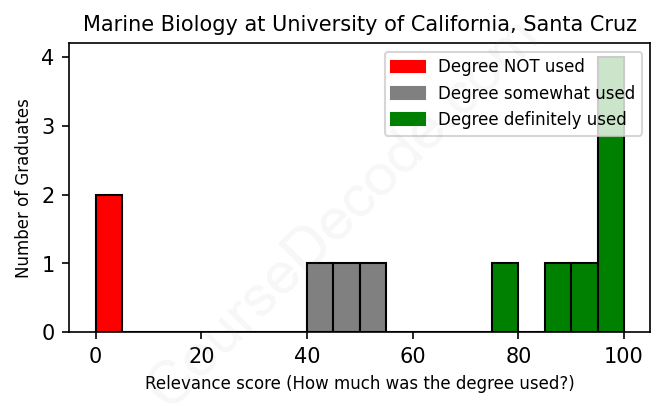
First, some facts. Of the Marine Biology graduates from University of California, Santa Cruz we've analyzed , here's how many have used (or NOT used) their degree in their career:

These are estimates based on AI analysis of 12 LinkedIn profiles (see below).
The verdict? Slightly below average. Overall, with an average relevance score of 65%, Marine Biology graduates from University of California, Santa Cruz have a slightly lower likelihood (-2%) of finding work in this field compared to the average graduate across all fields:
And for comparison, here's the chart for all profiles we've looked at across all degrees.
Also, after graduating, 41% of these graduates have pursued further education other than another Bachelor's degree (such as a Masters degree or other), compared to the average across all profiles of 35%. This suggests you may need more than just a Bachelors degree to be competitive as a Marine Biology graduate.
See the details:
|
Relevance score: 0% We think this person has NOT gone into a career related to their degree. We think this person has NOT gone into a career related to their degree.
DEGREE INFOGraduated in 2019 from University of California, Santa Cruz with a Bachelors Degree in Marine Biology. Also pursued further education since (see below). JOB HISTORY SINCE GRADUATIONPolice Communications Dispatcher The University of Tennessee at Chattanooga Jun 2022 - Present FURTHER DEGREES DONE SINCE GRADUATINGMResUniversity of Glasgow 2019 - 2020 ABOUTNo information provided. |
The top 10 most common jobs done by the graduates we've analyzed (ranked most common to least) are:
So, if you take a look at the jobs held by graduates of Marine Biology from UC Santa Cruz, you’ll notice a lot of them have stuck closely to roles that relate directly to their degree. Functions like Fisheries Technician, Fisheries Biologist, and roles at various aquariums totally fit the bill. For many, positions specifically aimed at conservation, field studies, and education about marine ecosystems form a big chunk of the job market. It makes sense since these positions typically require a solid grasp of marine biology principles, which these grads have honed throughout their academic journey.
However, not all jobs they secured were directly related to marine biology. Some folks ended up in roles like project management, office work, or completely different fields that don’t utilize their marine biology knowledge. While it’s great that they found employment, you can see a mix where some are leveraging their education to make an impact in marine conservation, while others have drifted into areas that, let’s face it, have little to do with fish or oceans. Overall, though, many have found ways to apply their studies in meaningful ways to marine life and the environment, showing that a degree in Marine Biology can open up some pretty relevant career paths!
Here is a visual representation of the most common words in job titles for Marine Biology graduates (this is across all Marine Biology graduates we've analyzed, not just those who went to University of California, Santa Cruz):

Looking at the career trajectories of graduates from UC Santa Cruz's Marine Biology program, it appears that many of them start off with roles that are closely related to marine science, particularly in educational and research settings. For instance, right after graduation, you’ll find a good number of folks working as technicians or educators at aquariums and marine laboratories. These first jobs often involve practical, hands-on engagement with marine life, whether it’s through research projects or teaching others about marine ecosystems. It seems like a solid start, showcasing their commitment to marine biology and conservation.
Fast forward five or ten years, and while some continue on paths directly related to marine biology, like advancing to senior scientist roles or educational management positions at various aquarium-related organizations, not everyone stays strictly in the field. A few graduates have shifted to roles that veer into different areas, such as public engagement or even unrelated fields like finance and emergency services. So, while many graduates do find fulfilling careers that tie back to marine biology, there's also a noticeable mix where some branch out significantly, suggesting that a Marine Biology degree can provide diverse opportunities—not just in science, but in various areas of community engagement and even business. Overall, it’s a mixed bag, showing both a passion for marine science and some graduates taking their skills into wider professional realms.
Getting a Bachelor’s degree in Marine Biology at UC Santa Cruz can be pretty challenging, but it also depends on your passion for the subject! The program can be demanding because it covers a lot of tough topics like ecology, marine systems, and research methods, and you’ll probably have to deal with some heavy-duty science courses like chemistry and biology. That said, if you love the ocean and marine life, it can be super rewarding and fun. It’s more rigorous than some other degrees, but if you keep up with your studies and get involved in fieldwork or lab research, it can really feel like a unique adventure rather than just hard work. Overall, it’s definitely a bit on the tougher side, but if you're genuinely interested, it can be a cool experience!
Most commonly, in the LinkedIn profiles we've looked at, it takes people 4 years to finish a Bachelor degree in Marine Biology.
Looking at the career paths of these Marine Biology grads from UC Santa Cruz, it seems like they’ve had some good opportunities but the pay might not be as high as you’d hope for, especially when you consider how much student loans can set you back. Those working in government roles or education, like the people from the first cohort, probably aren't raking in the big bucks, even though they might find their work fulfilling. Positions like "Senior Biologist" definitely sound impressive and likely come with better salaries, but it can take a while to climb the ladder. Others, like the ones who worked at places like the Monterey Bay Aquarium, might have had more fun or fulfilling gigs, but those roles often don't pay as well. Overall, it feels like they’re doing okay, but the financial rewards in this field can be hit-or-miss depending on the specific job and organization.
Here is a visual representation of the most common words seen in the "about" section of LinkedIn profiles who have a Bachelor degree in Marine Biology (this is across all Marine Biology graduates we've analyzed, not just those who went to University of California, Santa Cruz). This may or may not be useful:

Here are all colleges offering a Bachelor degree in Marine Biology (ordered by the average relevance score of their Marine Biology graduates, best to worst) where we have analyzed at least 10 of their graduates:
| College | Score | Count |
|---|---|---|
 University of California, Santa Cruz University of California, Santa Cruz
|
65 | 12 |